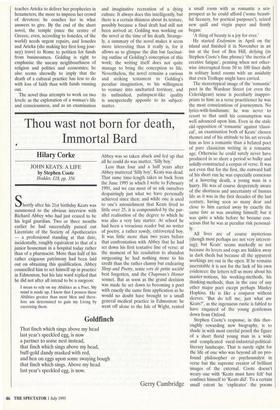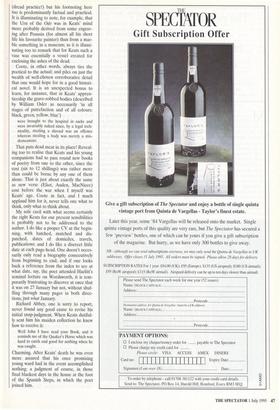Thou wast not born for death, Immortal Bard
Hilary Corke
JOHN KEATS: A LIFE by Stephen Coote Hodder, £18, pp. 356 Shortly after his 21st birthday Keats was summoned to the obvious interview with Richard Abbey who had just ceased to be his legal guardian. Two or three months earlier he had successfully passed out Licentiate of the Society of Apothecaries — a professional standing at that date, incidentally, roughly equivalent to that of a junior houseman in a hospital today rather than of a pharmacist. More than half of his rather exiguous patrimony had been laid out on obtaining this qualification. Abbey counselled him to set himself up in practice in Edmonton, but his late ward replied that he did not after all intend to be a surgeon:
I mean to rely on my Abilities as a Poet. My mind is made up, I know that I possess these Abilities greater than most Men and there- fore am determined to gain my Living by exercising them.
Abbey was so taken aback and fed up that all he could do was mutter, 'Silly boy.'
Less than four and a half years after Abbey muttered 'Silly boy', Keats was dead. That same time-length takes us back from the June 1995 in which I write to February 1991, and we can most of us ask ourselves despairingly just what we have personally achieved since then: and while one is used to one's astonishment that Keats lived to little over 25, it is compounded by the par- allel realisation of the degree to which he was also a very late starter. At school he had been a voracious reader but no writer of poetry, a rather rowdy, extroverted boy. It was little more than two years before that confrontation with Abbey that he had set down his first tentative line of verse: at the moment of his resolution to abandon surgeoning he had nothing more to his credit than the rather clumsy but endearing Sleep and Poetry, some vers de petite societe best forgotten, and the Chapman's Homer sonnet. But as soon as the grand decision was made he set down to becoming a poet with exactly the same firm application as he would no doubt have brought to a small general medical practice in Edmonton: he went off alone to the Isle of Wight, rented a small room with as romantic a sea- prospect as he could afford (`some beauti- ful Scenery, for poetical purposes'), seized new quill and virgin paper and firmly began: 'A thing of beauty is a joy for ever.'
He started Endymion in April on the island and finished it in November in an inn at the foot of Box Hill, defying (in Stephen Coote's fine phrase) 'the inertia of creative fatigue', penning when not other- wise interrupted from 50 to 100 lines daily in solitary hotel rooms with an assiduity that even Trollope might have envied.
The stereotypical image of the 'romantic' poet in the Wardour Street (or even the Coleridgean) sense is peculiarly inappro- priate to him: as a verse practitioner he was the most conscientious of journeymen. No lyrics-with-laudanum: he was never to resort to that until his consumption was well advanced upon him. Even in the stale old opposition of 'romantic' against 'classi- cal', an examination both of Keats' chosen themes and of his attitude to his art reveals him as less a romantic than a belated poet of pure classicism writing in a romantic age. Otherwise he could surely never have produced in so short a period so bulky and solidly-constructed a corpus of verse. It was not even that for the first, the outward half of his short run he was especially conscious of a hovering death, a young man in a hurry. He was of course desperately aware of the shortness and uncertainty of human life as it was in the first decades of the last century, having seen so many dear and close to him carried away by exactly the same fate as was awaiting himself; but it was quite a while before he became con- scious that he was at peculiar risk personal- ly.
All lives are of course mysterious (though most perhaps are not very interest- ing); but Keats' seems markedly so not because its levers and cogs are hidden away in dark sheds but because all the apparent workings are out in the open. If he remains inscrutable it is not for the lack of his own evidences: the letters tell us more about his master-notions, his working-methods, his thinking-methods, than in the case of any other major poet except perhaps Manley Hopkins. He is like a conjuror without sleeves. 'But do tell me, just what are Keats?', as the ingenuous rustic is fabled to have enquired of the young gentleman down from Oxford.
Stephen Coote's response, in this thor- oughly rewarding new biography, is to shade in with most careful pencil the figure of a short florid young man in a wide and complicated rural-industrial-political- literary landscape. That is surely right for the life of one who was beyond all no pro- found philosopher or psychoanalyst in verse but the supreme creator of brilliant images of the external. Coote doesn't weary one with 'Keats must have felt' but confines himself to 'Keats did'. To a certain small extent he 'explicates' the poems (dread practice!) but his footnoting here too is predominantly factual and practical. It is illuminating to note, for example, that the Urn of the Ode was in Keats' mind more probably derived from some engrav- ing after Poussin (for almost all his short life his favourite painter) than from a mar- ble something in a museum; as it is illumi- nating too to remark that for Keats such a vase was essentially a vessel created for enclosing the ashes of the dead.
Coote, in other words, always ties the poetical to the actual; and piles on just the wealth of well-chosen corroborative detail that one would hope for in a good histori- cal novel. It is an unexpected bonus to learn, for instance, that in Keats' appren- ticeship the grave-robbed bodies (described by William Osier as necessarily 'in all stages of putrefaction and of all colours: black, green, yellow, blue')
were brought to the hospital in sacks and were invariably naked since, by a legal tech- nicality, stealing a shroud was an offence whereas stealing a body was merely a mis- demeanour.
That puts dead meat in its place! Reveal- ing too to realise that Keats and his young companions had to pass round new books of poetry from one to the other, since the cost (six to 12 shillings) was rather more than could be borne by any one of them alone. That is just about exactly the same as new verse (Eliot, Auden, MacNiece) cost before the war when I myself was Keats' age. Coote in fact, and I much applaud him for it, never tells one what to think, only what to think about.
My sole cavil with what seems certainly the right Keats for our present sensibilities is probably not to be addressed to the author. I do like a proper CV at the begin- ning, with hatched, matched and dis- patched, dates of domiciles, travels, publications: and I do like a discreet little date at each page-head. One doesn't neces- sarily only read a biography consecutively from beginning to end; and if one looks back a reference from the index to see at what date, say, the poet attended Hazlitt's seminal lecture on Wordsworth, it is tem- porarily frustrating to discover at once that it was on 27 January but not, without shuf- fling through many pages in both direc- tions, just what January.
Richard Abbey, one is sorry to report, never found any good cause to revise his initial snap-judgment. When Keats dutiful- ly sent him his maiden collection he knew how to receive it:
Well John I have read your Book, and it reminds me of the Quaker's Horse which was hard to catch and good for nothing when he was caught.
Charming. After Keats' death he was even more assured that his once promising young ward had in the event accomplished nothing: a judgment of course, in those final blackest days in the house at the foot of the Spanish Steps, in which the poet joined him.



































































 Previous page
Previous page